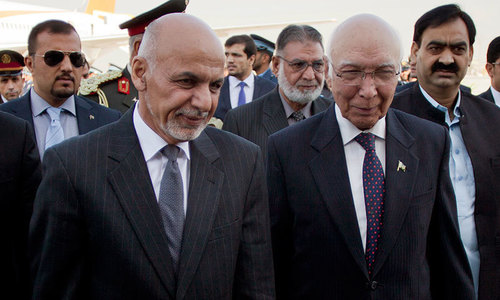After unnecessary tensions and squabbling, Pakistan and the US are once again demonstrating that cooperation between them is possible and realistic.
A series of high-level meetings in the US and Pakistan between officials of the two countries and the upcoming visits of the US secretaries of state and defence to Pakistan appear to have opened the door to a serious and frank dialogue.
Underscoring the potential for cooperation across a range of issues, intelligence sharing between the US and Pakistan appears to have rescued a young Canadian-American family of five from the captivity of the Haqqani network. It is surely too early to suggest that a new equilibrium in the bilateral relationship between the two countries will be found, but a quiet determination on both sides to focus on resolving issues rather than creating new problems could bring about some much-needed stability.
For the administration of US President Donald Trump, the lesson ought to be that hectoring and threatening Pakistan will not work. Indeed, Mr Trump’s policy speech on Afghanistan was such a poorly thought-out affair that it threatened to derail the entire relationship.
Pakistan may not be cooperating with the US to the extent that the latter expects or demands. But, leaving aside the question of whether or not some of these demands are legitimate or in Pakistan’s interest, Pakistan has consistently demonstrated that it does want stable ties with the US. To mindlessly jeopardise bilateral cooperation by arm-twisting Pakistan or threatening to give India a larger role in Afghanistan is to ignore that the US needs Pakistan to help establish peace in the region in the long term.
Now that the doors to engagement without humiliation have been reopened by the Trump administration, Pakistan has demonstrated that it remains a rational actor willing to adjust to new realities where possible and in this country’s interests.
For Pakistan, the lessons are many. In dealing with an uncertain US administration headed by a mercurial president, there may have been a temptation to respond emotionally to unsavoury US rhetoric and demands.
Fortunately, it appears that knee-jerk reactions have been avoided for now and a more pragmatic approach has been adopted. That approach should focus on areas where Pakistan can cooperate immediately — cross-border militancy and the regional fight against the militant Islamic State group, for example — while patiently building support elsewhere for initiatives the US is not willing to embrace, such as dialogue with the Afghan Taliban.
Where the US is wilfully in the wrong, the recent aspersions cast on CPEC being an example, Pakistani officials should convey their firm objections and this country’s determination to pursue its legitimate interests and relations with other countries.
If a reset in ties is not possible, a modicum of stability can surely be achieved.
Published in Dawn, October 14th, 2017















































